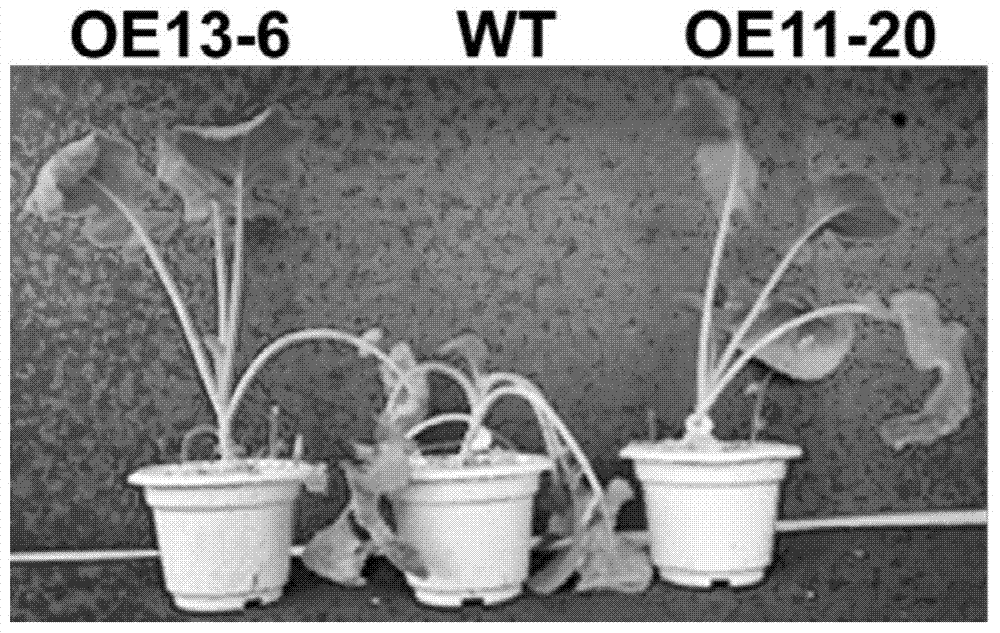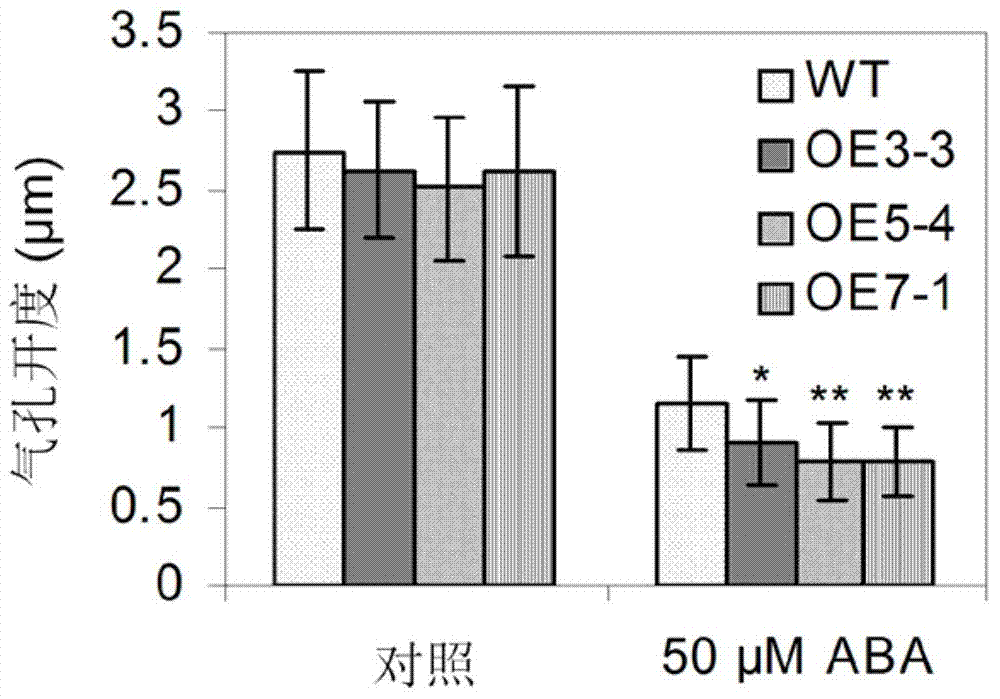Application of PLD alpha1 gene in aspects of increasing crop drought resistance and seed production
A technology of drought resistance and genetics, applied in the field of plant molecular breeding and biology, can solve the problems of limitations and unclear effects of PLD, and achieve the effects of enhancing biological yield, reducing water transpiration, improving water retention capacity and drought resistance
- Summary
- Abstract
- Description
- Claims
- Application Information
AI Technical Summary
Problems solved by technology
Method used
Image
Examples
Embodiment 1
[0031] Embodiment 1: Rapeseed genetic transformation (rape transgenic means-dark light cultivation method)
[0032] Seed sterilization and germination: After soaking the seeds with 75% alcohol for 1 min, rinse the seeds with sterile water. Then use 0.15% HgCl 2 (containing 0.1% (v / v) Tween20) for 15 minutes, then rinsed with sterile water for 3-5 times; then sow the seeds in M 0 In the culture medium, 18 seeds were evenly sown per dish (3 cm in diameter). Put the petri dish into a sterile plastic culture box, and culture it at 25°C for 5 days under dark and light conditions.
[0033] Cultivation of Agrobacterium: Pick a single colony of Agrobacterium (GV3101, a strain containing the AtPLDα1 gene plasmid, purchased through a commercial channel) and put it in LB liquid medium (containing 50 mg / L kanamycin) for 1-2 days. The best infection OD value is 0.6-0.8. Use a spectrophotometer to detect the concentration of the bacterial solution under the condition of 600nM light abso...
Embodiment 2
[0043] Example 2: Identification and expression of PLDα1 transgenic plants
[0044] (1) Identification of PLDα1 transgenic plants
[0045] Plants transformed with Agrobacterium in M 4 After the roots grow in the culture medium, take an appropriate amount of leaves (preferably newly grown leaves far away from the culture medium to prevent Agrobacterium contamination) to extract DNA, and use the primer KatI-p / PLDα1-A to perform DNA extraction on the leaves. PCR detection, while the plasmid was used as a positive control, and the DNA of WT plants was used as a negative control, to identify whether the AtPLDα1 gene was successfully transferred into the genome of the regenerated plants resistant to kanamycin. It can be seen from the results that most of the plants can amplify a fragment with the same size as the PCR product of the plasmid as a template, while a few lines and the control wild-type WT do not amplify the current fragment, which shows that the culture in dark light T...
Embodiment 3
[0061] Example 3: AtPLDα1-OE plants enhance drought tolerance and seed yield
[0062] (1) The stomata of AtPLDα1-OE plants are more sensitive to ABA
[0063] In order to test the effect of AtPLDα1-OE plants on water use, the transgenic plants of Westar and Zhongshuang 9 were planted in soil and grown in a growth chamber. Use a hole punch to remove about 0.5 cm from the fully expanded leaves of the 23-day leaf year 2 The leaf discs were placed in the buffer that induces stomatal opening (under light conditions) and incubated for 1 h, and the opening of the stomata was observed under a microscope. When about 90% of the stomata are open, add 50 μM ABA to the buffer and continue to incubate for 30 min, and observe the change of stomatal conductance under a microscope. The results showed that the stomatal diameter of AtPLDα1-OE plants was not significantly different from that of WT plants when the stomata were induced to open by light. However, after adding ABA for 30 min, the s...
PUM
| Property | Measurement | Unit |
|---|---|---|
| length | aaaaa | aaaaa |
Abstract
Description
Claims
Application Information
 Login to View More
Login to View More - R&D
- Intellectual Property
- Life Sciences
- Materials
- Tech Scout
- Unparalleled Data Quality
- Higher Quality Content
- 60% Fewer Hallucinations
Browse by: Latest US Patents, China's latest patents, Technical Efficacy Thesaurus, Application Domain, Technology Topic, Popular Technical Reports.
© 2025 PatSnap. All rights reserved.Legal|Privacy policy|Modern Slavery Act Transparency Statement|Sitemap|About US| Contact US: help@patsnap.com



